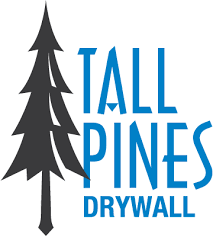Frequently Asked Questions and Video
Tall Pines Drywall is your go to source for any questions you have about our industry, drywall, framing, you name it. Here are a few questions we get asked that may help you and some videos from our new YouTube Channel.
what is drywall?
Drywall is basically heavy panels of gypsum pressed between heavy sheets of paper. It is also referred to as Sheetrock (a trademark of USG Corporation), plasterboard, or wallboard. It is used for walls and ceilings as well as design features like arches, eaves and much more.
can i hang drywall by myself?
Yes, but be aware - hanging drywall is a labour intensive job that requires hand eye coordination, attention to detail, and precision. We recommend hiring a professional. If you decide to do it yourself, you should consider buying or renting a lift to save your back. Once the drywall is hung, you will need to finish it with taping and consistency. Finally, when this is done, you will need to cover over the tape with a second layer of finishing compound. Check our blog for how to and more information.
Can you paint directly on drywall?
No. After hanging your drywall, mud and primer it. Drywall primer helps the paint adhere properly.
how thick is drywall?
Standard drywall thicknesses (depending on different building codes and requirements) are a 1/4-inch, 1/2 inch, 5/8 inch. 1/4-inch thick drywall is useful when you need to install drywall on a slightly curved surface. Half inch drywall panels are used for most interior walls and ceilings. 5/8 inch drywall (also referred to as fire drywall) is ideal for commercial construction and soundproofing.
What’s the difference between type x and c drywall?
Both of these types of drywall are intended to increase safety and prevent the spread of fire. Type X drywall is 5/8 inches thick and contains gypsum with noncombustible glass fibers, which increases the fire rating minimum 1 hour. Type C drywall is the improved version of the x type and available in 1/2” and 5/8” thicknesses. The difference in this type of drywall is that it contains more glass fibers than type X drywall with additional vermiculite components. These extra qualities make it more resistant to fire, slowing its spread by 2-4 hours.
why does drywall crack?
There are a few reasons why drywall cracks:
Normal settling over time
New home
Home left vacant
Inferior taping/drywall installation
A leak
Foundation damage
is gypsum the same as drywall?
Although used for the same purpose there are many differences between gypsum and drywall. Gypsum is a natural mineral used in construction work, while drywall is a manufactured product with gypsum as one of its raw materials. Gypsum has different properties like heat resistance and durability, drywall has great soundproofing qualities, is easy to install and repair, and can be very durable.

